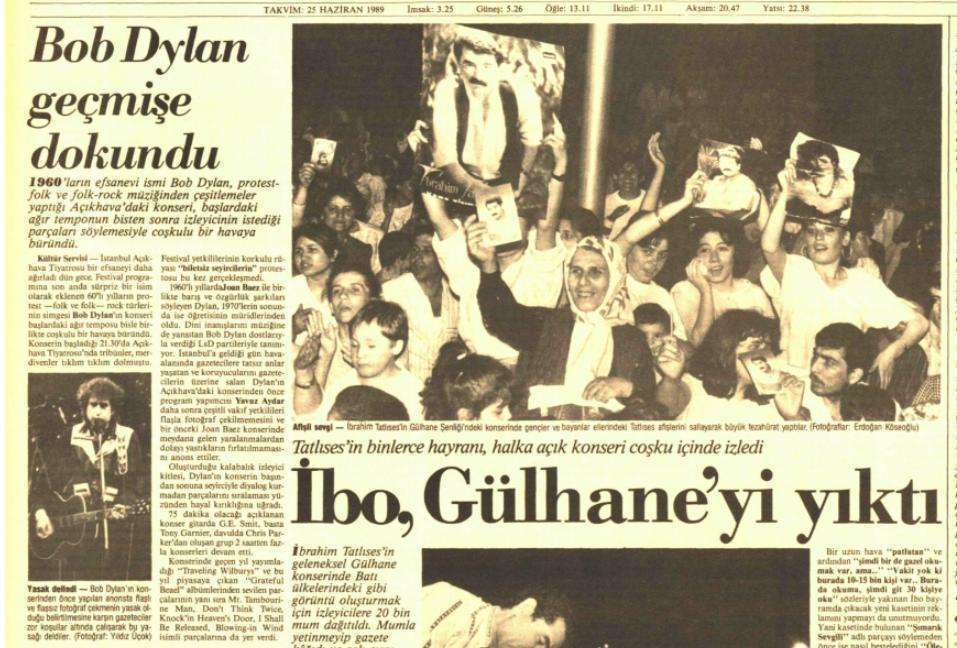Bob Dylan, the iconic American singer-songwriter, has captured the hearts and minds of people all over the world with his poetic lyrics and soulful melodies. However, it is particularly fascinating to explore why Turks have a deep admiration for this legendary artist. From the 1960s until today, Bob Dylan’s music has resonated with Turkish audiences and has had a profound impact on Turkish society and culture. In this article, we will delve into the historical context, the influence of his music and lyrics, his role in Turkish protest movements, the Turkish artists he has inspired, his visits to Turkey, and his lasting legacy in the country.
Bob Dylan wrote about The Chronicles of Turkish origin when in his autobiography published last autumn (2014), in memories , Bob Dylan talking about his ancestors which came from İstanbul(Turkey ) then moved to Trabzon (Turkey ) and finally moved to Odessa (Ukrain)
Historical context: Bob Dylan’s influence on Turkish society and culture
To understand the immense popularity of Bob Dylan in Turkey, it is essential to examine the historical context in which his music emerged. In the 1960s, Turkey was going through a period of political and social transformation. The country was experiencing a wave of youth activism and cultural awakening, with young people seeking to challenge traditional norms and embrace new ideas. Bob Dylan’s songs, with their powerful messages of protest and social change, resonated deeply with this generation of Turkish youth. His music became a soundtrack for their struggle for freedom and expression.
Bob Dylan’s music and lyrics resonate with Turkish audiences
One of the main reasons why Turks pay so much attention to Bob Dylan is the timeless appeal of his music and lyrics. From his early folk ballads to his electric rock anthems, Dylan’s songs speak to the universal themes of love, justice, and the human condition. His poetic and introspective lyrics, often tackling political and social issues, strike a chord with Turkish audiences who appreciate the depth and thoughtfulness of his words. Dylan’s ability to capture the essence of the human experience and convey it through his music is what makes him a beloved figure in Turkey.
Bob Dylan’s impact on Turkish protest movements
Throughout history, Turkey has witnessed numerous social and political movements, and Bob Dylan’s music has played a significant role in inspiring and fueling these struggles. During the 1970s, when Turkey was under the grip of a repressive military regime, Dylan’s songs became anthems of resistance for those who fought against oppression. His lyrics spoke to the disillusionment and frustration felt by many Turks, providing a voice for their grievances and a rallying cry for change. Even today, his music continues to resonate with activists and protesters in Turkey, serving as a reminder of the power of music in the face of adversity.
Turkish artists influenced by Bob Dylan
Bob Dylan’s influence extends beyond his own music and has left a lasting impression on Turkish artists from various genres. Many Turkish musicians and singer-songwriters have drawn inspiration from Dylan’s distinctive style, incorporating elements of folk and protest music into their own work. Artists like Barış Manço and Edip Akbayram, to name a few, have cited Dylan as a major influence on their artistic journey. His impact on the Turkish music scene has been profound, shaping the sound and direction of the country’s contemporary music landscape.
Turkish opera and folk singer Ruhi Su Covers Bob Dylan “Blowin’ in the Wind” in 1970
“At that time Bob Dylan was a 22-23 year old man, Ruhi Su was a saz lover from Turkey who came out of the opera, collected Alevi sayings, spent time in jail, had programs in casinos, tried to exist, tried to earn a living from music by releasing records; now he is in his 62s and sings a protest song with Turkish lyrics on his saz.”
Bob Dylan’s visits to Turkey and his connection with Turkish fans
On May 31, 2010, Bob Dylan performed a concert in Istanbul, Turkey at the Harbiye Cemil Topuzlu Açıkhava Tiyatrosu (Cemil Topuzlu Open Air Theatre)
The concert received positive reviews and left a lasting impression on the audience . Bob Dylan’s performance in Turkey on that day showcased his enduring talent and musical prowess
On June 20, 2014, Bob Dylan performed a concert at the Volkswagen Arena in Istanbul, Turkey, as part of his Never Ending Tour. The band members for the concert included Tony Garnier on bass, George Recile on drums, Stu Kimball on guitar, and Bob Dylan himself on vocals, piano, and harmonica
Exploring the reasons behind Turks’ admiration for Bob Dylan
While there are several factors that contribute to the Turks’ admiration for Bob Dylan, one key aspect is the universality of his music. Despite being an American artist, Dylan’s songs touch upon themes and emotions that are universally relatable. His lyrics transcend language and cultural barriers, allowing Turkish listeners to connect with his music on a profound level. Additionally, Dylan’s authenticity and uncompromising artistic vision have earned him respect and admiration, as Turks appreciate his dedication to his craft and his unwavering commitment to speaking his truth.

“Dylan is a voice that gives you peace. Not an eternal peace that makes you forget everything, but a peace that is always incomplete and disturbing. Lonely, very protesting and always prone to rebellion. A voice like sandpaper. A voice that dusts off all memories, passes through grief, and accompanies men who cling to their own collars. The sadness of African-Americans working in poverty in the sugar cane fields has obviously touched his voice, students who have been expelled from school, workers who always go home late, draft dodgers, rain dodgers, love dodgers, world dodgers… Everyone caught in the rain in Bob Dylan’s voice must have a story.” source
